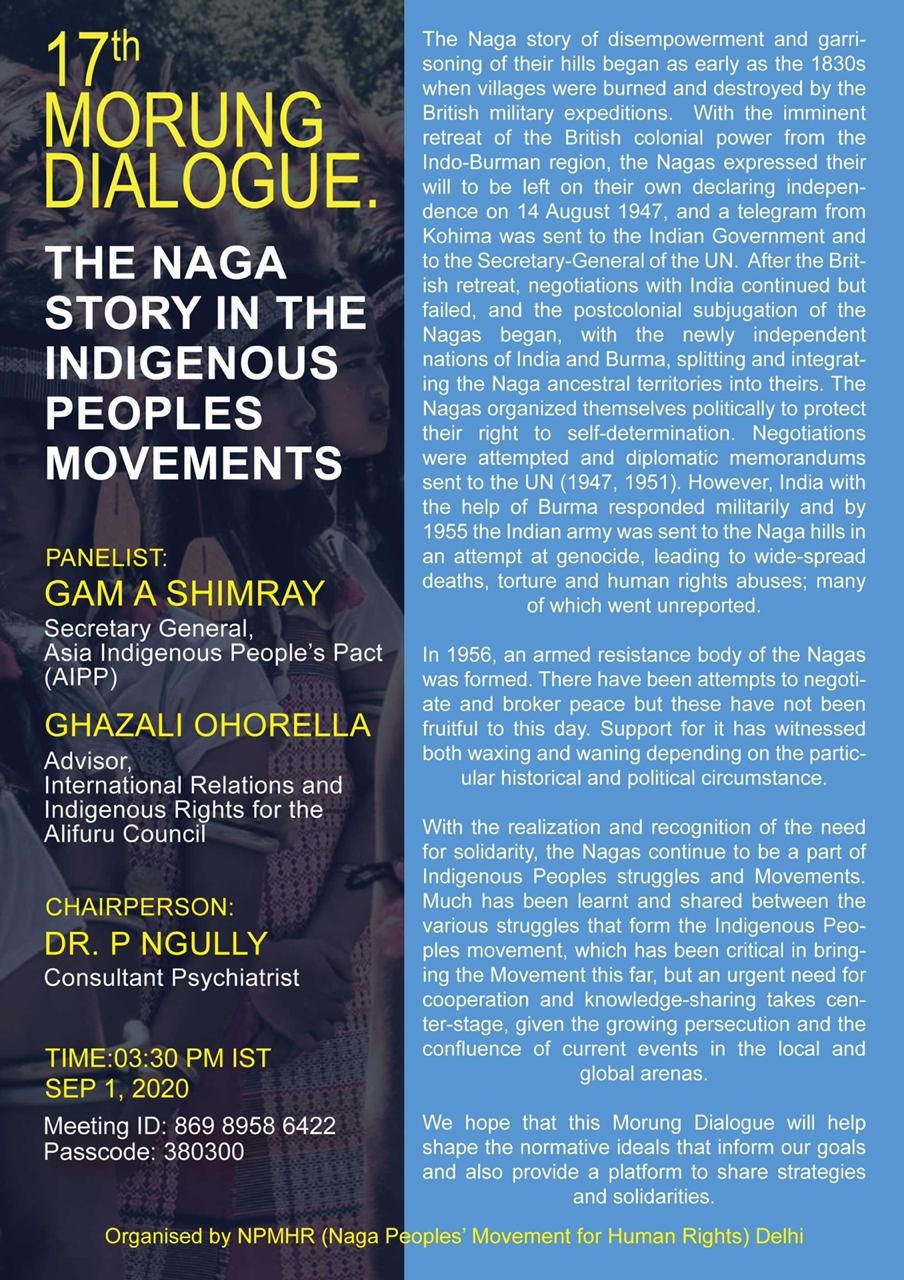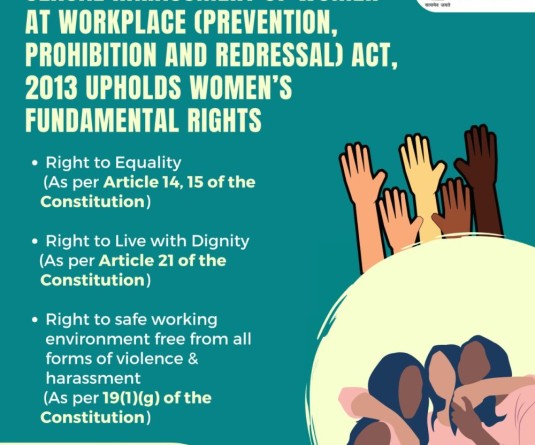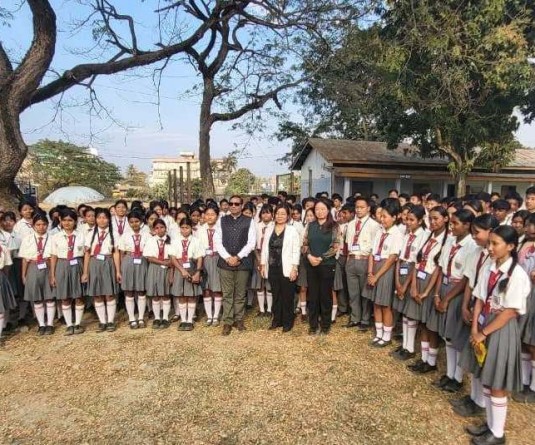
The Naga story in the Indigenous Peoples movements-1
Dimapur, September 3 (MExN): Naga People’s Movement for Human Rights (NPMHR) hosted its 17th Morung Dialogue series on the topic ‘The Naga story in the Indigenous Peoples movements’ on September 1.
NPMHR press release stated that Dr P Ngully, Consultant Psychiatrist who chaired the dialogue began by narrating how his elders in the village used to say that if we as a people don’t defend and protect out dignity and humanity, then a time will come when we would be transformed into “miniature tiny creatures” climbing on the chilli and brinjal plants thinking they were trees. “I wonder which stage of that ‘prophecy’ we as a people have reached,” he paused.
Maluku and Naga Story
The first panelist Ghazali Ohorella, Advisor, International Relations and Indigenous Rights for the Alifuru Council attempted to unpack the right to self-determination which is so important to the indigenous peoples through his story as a Maluku, a group of 999 islands located between Australia and the Philippines, with 2 million indigenous peoples living which was colonized by the Dutch for over 300 years.
Like the Naga story, after the Dutch left, Indonesia invaded the islands, creating the Republic of Indonesia. The Malaku declared Independence on April 25, 1950, but to this day they remain an occupied nation, and still fighting to regain independence.
“Proclaiming our Independence itself is an act of self-determination, it is the choice of the people, and it is a virtue of all peoples,” he stated.
He quoted the UN Charter and pointed out that it is scripted as “We the Peoples, not we the Nations” and it includes that “all peoples have the right to self-determination” as provided in article 3 of the United Nations Declaration on the Rights of Indigenous Peoples (UNDRIP).
He mentioned the other conventions such as International Convention on Economic, Social and Cultural rights (ICESCR) and International Convention on Civic and Political rights (ICCPR) which have the same article on the Right to Self-Determination and drove the point that self-determination is the pinnacle of the rights that a peoples can have and it is the opposite of colonization.
Keep claiming right to self-determination
He reminded that the UN was created after WW2 when the decolonization movement started emerging in Asia, Africa and all over the world. “The opposite of colonization,” he said “is self-determination which is a right of all peoples.”
According to him, this makes it important that the indigenous peoples keep claiming it, including the Nagas.
“Nagas have their own culture, land, common heritage and history which describe Nagas as a people. It is not upto a country to decide whether the Nagas are a peoples or not, which is a part of the right to self-determination,” and that right he said “has been a very important part in the work of indigenous peoples all over the world trying to claim right to self-determination, to address all the historical grievances that have occurred, and making sure that we can survive and thrive as a peoples for the next 7 generations.”
“We are not just looking at making things better tomorrow but building for the next 7 generations, so that our grandchildren’s grandchildren can say, I am a Naga and I am proud to be a Naga,” he continued and added “is the essence of continuously claiming our right to self-determination; So that right is a very strong foundation in the various movements around the world.”
Respect right to self-determination
It was pointed out that indigenous peoples looking at the Sustainable Development Goals (SDGs) ensure that indigenous peoples are included and that their rights are respected, be it traditional knowledge, biodiversity, climate change. A whole host of issues that indigenous peoples are facing depend on the right to self-determination as a basis.
One of the challenges from the indigenous peoples perspective, he said, is that one section of indigenous people are continuously trying to make sure that our right to self-determination is respected, and on the other hand there is a trend that NGOs, conservation organizations and states bring up free, informed, prior (FPIC) consent, which is also a part of the declaration of the rights of indigenous peoples. “But it is important that we keep emphasizing the right to self-determination because the free part of FPIC is a product of self-determination,” he asserted.
Indigenous people’s rights are collective rights
Stating that the Naga people are not alone in the world and there are many indigenous peoples that want to be self-governing and autonomous, or independent, or have a form of sovereignty, he said that it is important that indigenous peoples all over the world to make sure that the right to self-determination is being discussed on the table.
“These are rights we should have had all along. The 46 articles of the UNDRIP 46 are not new rights. It is important to understand that the rights of the indigenous peoples are derived from existing Human Rights; the only difference is that indigenous people’s rights are collective rights,” he stated.
Bring back dialogue on self-determination
He also mentioned that right to self-determination is in constant development, as indigenous peoples all over are trying to bring it back to discussion tables and have dialogues around it.
He noted that virtual forums allow having dialogues not just in the Naga context, or Asia context, but on a global context of indigenous peoples, “on our rights and the right to self-determination, so that that we can all unpack it together and make sure that self-determination is on the agenda all over the world.”
Self-determination, he concluded, “is the basis of everything. It is connected to self-identification, the right to represent yourself in meetings, the right to eating your own food, the right to follow your own religion, to have education in your own language in schools, to learn your own history. It is not just about nationalist aspirations, but also the right to transmit your own heritage for generations to come, and you can only do that if we claim the right to self-determination.”
Self-identification and recognition
Responding to one of the participants, in helping understand the tension between self-identification and recognition by others, Ghazali reminded that the indigenous peoples already existed before the political nations.
“So, the right to self-determination, we didn’t call it rights, it was just ethics to us, something natural to us and goes without saying. The only thing is now we have to codify it and move it under the right to self-determination. That is what we had to fight for,” he stressed.
He also mentioned that the tension between self-identification and recognition is that self-identification is built on self-determination. “Self-determination is something that many states right now would not like to entertain, be it in dialogues or decision making, and self-identification is something that gives the right back to the indigenous peoples to decide who they are.”
To the Nagas, he advised to “have tremendous patience to achieve your national aspiration, but on a daily basis work as hard as possible to keep claiming your right to self-determination, keep speaking your own language and working towards that big goal. Then recognition will be more sustainable.”
In his concluding remarks, Ghazali stressed on the need to have more frequent and in-depth meetings and in the global context as well that will benefit the Nagas and strengthen global solidarity and the global fight for right to self-determination and ended with a call to action for “What do we do next?”
The Morung Dialogue is a talk series organized by NPHMR, Delhi since 2014 with the objective of “strengthening the power of conversation and sharpening understanding through sharing ideas and views on issues that affect our life and contribute to democracy, JustPeace and social justice.”






